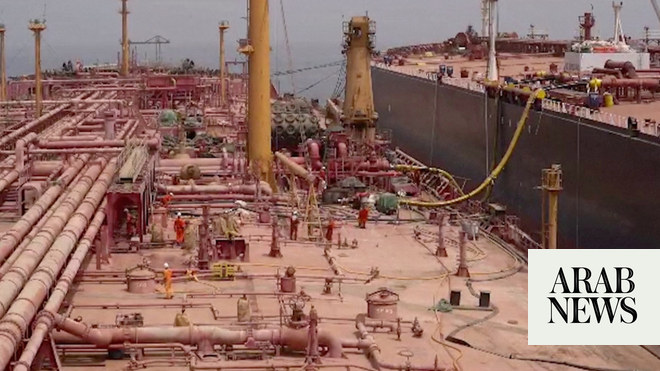
The failure of the negotiations came after the Houthi militia rejected four previous agreements
Safer has been moored in the Red Sea, north of Hodeidah, since it fell into Houthi hands in 2015
RIYADH: Yemen’s information minister said the failure of negotiations between the UN and the Iran-backed Houthis over the floating Safer oil tanker was “not surprising,” in light of the militia’s continued procrastination and elusiveness over the issue.
Moammer Al-Eryani said the Houthi militia have been using the file as a bargaining chip, tool for blackmail, and an attempt to achieve political gains without heeding warnings of an impending environmental, economic and humanitarian disaster.
Safer has been moored in the Red Sea, north of Hodeidah, since it fell into Houthi hands in 2015. Carrying over one million barrels of oil, the vessel’s situation is deteriorating and if it spills, could threaten an ecological disaster four times worse than that of the Exxon Valdez oil spill in Alaska.
2-Failure came after Houthi militia overturned four previous agreements to allow an intl technical team to board &assess technical condition &repair Safer &failure of intl efforts to persuade Houthis to cooperate &prevent expected disaster due to leak, sink or explosion of tanker
— معمر الإرياني (@ERYANIM) June 3, 2021
“The failure of the negotiations came after the Houthi militia rejected four previous agreements, under which it committed itself to allowing a UN technical team to board the tanker, assess its technical condition and maintenance, and all international efforts to persuade the militia to cooperate to prevent the expected catastrophe of the tanker leaking, sinking or exploding have failed,” Al-Eryani said in a series of tweets.
He called on the international community, the UN and the countries bordering the Red Sea to bypass the Houthi militia, and take urgent action to avoid a catastrophe the largest of its kind, which he said would “harm millions of civilians in Yemen and the region, and will have serious consequences on the movement of navigation in one of the most important international corridors.”







